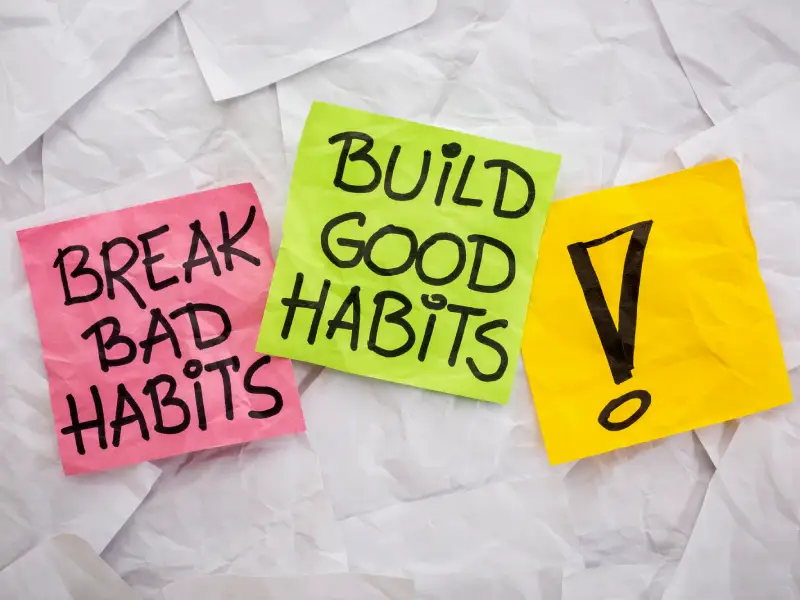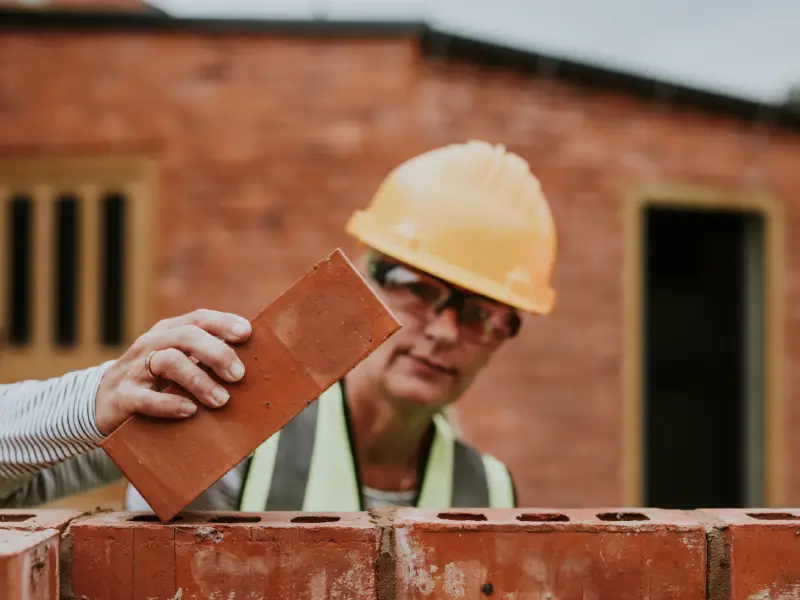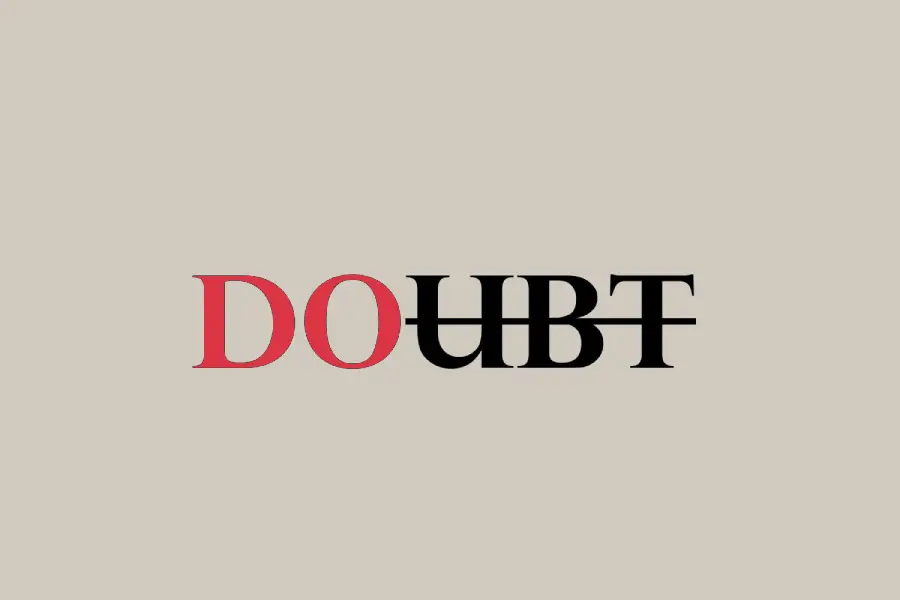
Good habits can help you reach your goals and live a more fulfilling life. We’ll discuss how habits are formed, why they’re important, and how to stick with them. So if you’re looking for ways to improve your life and your processes, this article is for you.
In our fast-paced world, we’re often searching for better, quicker, and more effective solutions. Whether it’s achieving a certain net worth, hitting a career-high, owning a yacht, or having the perfect summer body, we want it and we want it now.

However, the vast majority of us will not hit the jackpot, so it is worth remembering that success often comes incrementally. A solid structure is laid brick by brick, layered with foresight and determination. And here’s where the age-old wisdom of building good habits comes in.
Everyone are nearly alike; it is their habits that set them apart.
Habits are important because they automate our behaviours and actions, making us more efficient and freeing up mental energy for other tasks. When we build good habits, we can improve our productivity, health, and overall well-being. Habits also provide structure and consistency in our lives, helping us stay on track with our goals. They reinforce positive behaviours and contribute to our personal growth and self-discipline.
In other words, we are what we repeatedly do.
The science behind the formation of good habits
The ancient philosophers understood the power of habits; let’s look at what we currently know from modern studies of the brain and human behaviour:
Habit loop
Habits are often described as a loop consisting of three components: cue, routine, and reward. This model, proposed by Charles Duhigg in “The Power of Habit”, suggests that habits are formed through a repetitive cycle. The cue serves as a trigger for the behaviour or habit, the routine is the behaviour itself, and the reward provides a sense of satisfaction or pleasure.
Basal ganglia
The basal ganglia, a part of the brain involved in motor control and reward processing, plays a crucial role in habit formation. As habits are repeated, the basal ganglia become more efficient in automating the behaviour. This allows the habit to become more automatic and require less conscious effort over time.
Neuroplasticity
The brain’s ability to change and adapt, known as neuroplasticity, plays a role in habit formation. When a behaviour is repeated, the connections between neurons in the brain strengthen, making it easier for the behaviour to occur in the future. This process involves synaptic plasticity, where the strength and efficiency of connections between neurons are modified.
Dopamine and rewards
The brain’s reward system, particularly the release of dopamine, plays a significant role in habit formation. When a behaviour is associated with a reward or pleasurable experience, dopamine is released, reinforcing the habit and making it more likely to be repeated in the future.
Context and environmental cues
Environmental cues or triggers can play a crucial role in habit formation. The context or setting in which a habit occurs can serve as a cue that triggers the behaviour. Over time, the association between the context and the behaviour strengthens, making the habit more automatic when the context is encountered.
Habit formation and repetition
Consistency and repetition are key factors in habit formation. The more frequently a behaviour is repeated, the more likely it is to become a habit. Repetition helps strengthen the neural pathways associated with the habit and reinforces the connection between the cue, routine, and reward.
How long does it take to establish a good habit?
So we know that anything worthwhile in life takes time. But exactly how much time? When it comes to habits, several factors should be considered, including the individual, the complexity of the habit, and the consistency of practice. While there is no fixed timeline, research suggests that it can take anywhere from a few weeks to several months for a behaviour to become automatic and ingrained as a habit.
A commonly cited figure is around 21 days or three weeks, which originated from a study conducted by Dr. Maxwell Maltz in the 1950s (the book entitled, “Psycho Cybernetics“). However, more recent research indicates that the time required to establish a habit is (unfortunately) longer, typically ranging from 66 days to around 254 days or more, depending on the individual and the behaviour being targeted.
Consistency and repetition are key. Stay the course, even if it takes longer than expected.
I want to build good habits! Where do I start?
Ready to take the first step to adopt a new habit? Developing and maintaining good habits requires a systematic approach and consistent effort. Here are some strategies that will help:
1. Start small
Begin with a small and manageable habit that you can easily incorporate into your daily routine. Starting with something too ambitious can be overwhelming and increase the chances of giving up. As you build consistency, you can gradually increase the complexity or duration of the habit.
2. Set a specific goal
Clearly define the habit you want to develop and make it as specific as possible. For example, instead of saying “exercise more”, specify the habit as “go for a 30-minute walk every morning”. Specific goals provide clarity and make it easier to track progress.
3. Create reminders
Use reminders to prompt yourself to engage in the habit. Set alarms, place sticky notes, or use digital tools like calendar alerts or habit-tracking apps. Consistent reminders help by keeping the habit at the forefront of your mind.
4. Establish a routine
Incorporate the habit into your daily or weekly routine. Choose a specific time or trigger that signals the start of the habit. Consistency is key in habit formation, so try to perform the habit at the same time or in the same context each day.
5. Track your progress
Keep track of your habit development to monitor your consistency and progress. Use a habit tracker app, a journal, or a simple checklist to record each instance of successfully completing the habit. Visualizing your progress can be motivating and reinforce your commitment.

6. Stay accountable
Find an accountability partner or share your habit goals with someone you trust. This can be a friend, family member, or colleague who can support and encourage you in your habit-building journey. Regular check-ins and sharing your progress can help you stay on track.
7. Be resilient
Expect setbacks and be prepared to encounter obstacles along the way. It’s normal to slip up occasionally, but the key is to not let a temporary lapse derail your progress. When setbacks occur, reflect on the reasons behind them, learn from them, and recommit to your habit.
8. Celebrate milestones
Acknowledge and celebrate small achievements as you progress. Reward yourself for reaching certain milestones or sustaining the habit for a specific duration. Celebrations provide positive reinforcement and motivate you to continue.
Remember, it takes time and consistent effort to develop a habit. Stay patient, stay committed, and keep practicing the habit until it becomes a natural part of your routine.
Ashton’s Story

Ashton has a wife and two children (The names and identifying details have been changed to protect the privacy of certain individuals). He held a regular office job and lived in a decent upper-middle-class neighbourhood. An unfortunate car accident left him with PTSD and ensuing depression. He became reclusive, lost interest in life, and eventually lost his job. After numerous visits to doctors and months of self-reflection, he decided that he wanted to turn his life around and regain what he had lost. A large part of that process involved breaking bad habits and forming new and better ones.
“Your good habits will determine your future”
One of the first things he did was to fix his eating habits. He ditched the junk food bingeing and went clean – incorporating balanced food groups at healthy intervals, drinking more plain water, and limiting coffee to just two cups a day. He practiced intermittent fasting from time to time while allowing himself the occasional indulgence.
Next, he decided to shed the weight that years of inactivity had caused. He started going for regular walks which eventually turned into jogs. Then, he researched and spoke with trainers, and eventually trained for his first marathon. And finally, he became passionate about fitness and exercise and started urging his friends to accompany him on his runs, taking them on uphill hikes and timed runs around parks.

Ashton then decided that he wanted to exercise his mind, and added reading to his growing list of good habits. He aimed for books on self-development, history, economics, and current issues, later allowing himself fantasy and fictional books “for the fun of it”.
When preparation meets opportunity
With his newfound self and confidence came job offers. He admitted that he didn’t actively look for work at that stage; the jobs came knocking instead. He decided to take up employed work again but told his employers upfront that he would stay for only a year or two max until the project was complete or he had left a tangible improvement on the organisation. And this was because he already had a growing clientele who sought him out as a marathon trainer or fitness coach, and he found more meaning and purpose in helping others be a better version of themselves than working for a corporate organisation.
The last time we checked up on Ashton, he was planning a vacation with his wife and kids, had four clients to chase around his regular park on the coming weekend, and was aiming to quit his current employment within six months once he had delivered the required results.
It was not an easy road and there were many factors at play, but building and maintaining good habits was and continues to be a major part of Ashton’s success today.
Big things come from small good habits
Whatever your career or personal goals may be, it all starts with a single step. Then you repeat that step, over and over and over again, until it becomes second nature to you. Then you add more positive steps toward that goal. Rinse and repeat. Keep your eyes on the goal and eventually, you will reap the rewards of your work. Except by then, it won’t feel like work anymore. It will simply be… a habit.
If you would like a mentor or coach to help you along on your habit-building journey, let us link up.
Coaching is available
Our coaching will unlock your potential and provide top-down clarity and confidence. Actionable goals and awareness will help bring growth and change.Contact Us
Call: +61 419 718 719
Office Hours:
- Weekdays from 9 am to 5 pm
- Weekends by Appointment Only
Articles

Building Strong Foundations: Resilience for a Small Business

Embrace Discomfort to Fuel Your Learning and Personal Growth

Why Hiring for Potential Is A Smart Move

12 Factors that contribute to personal success (Part 2)


